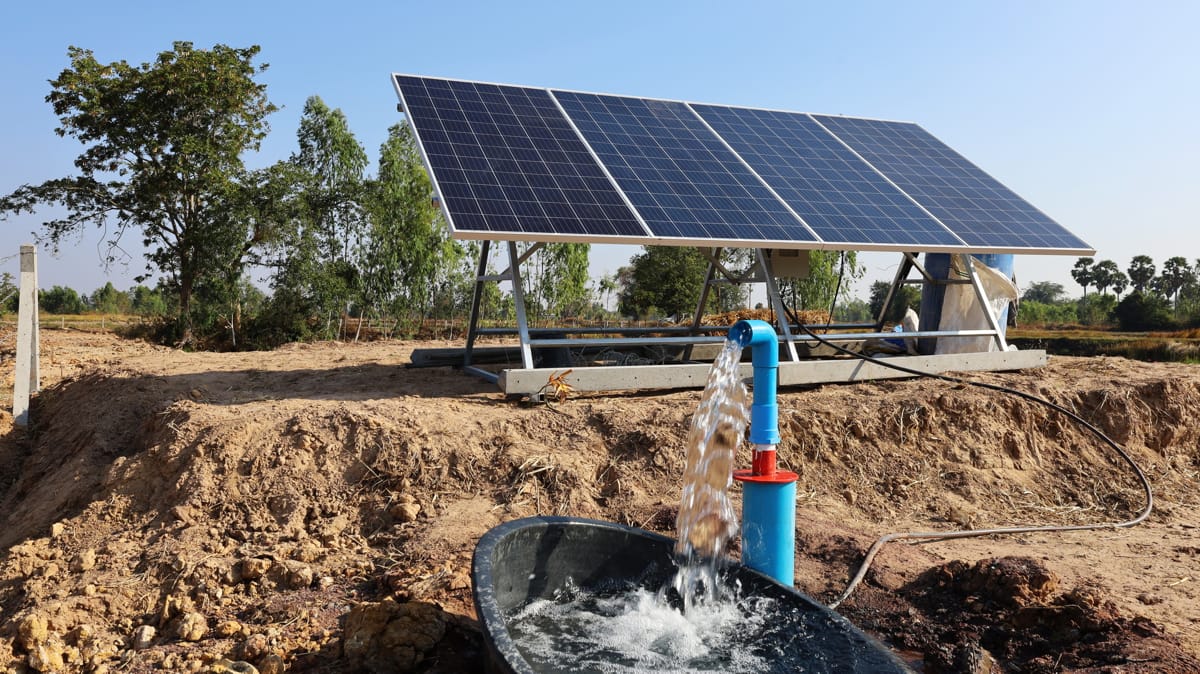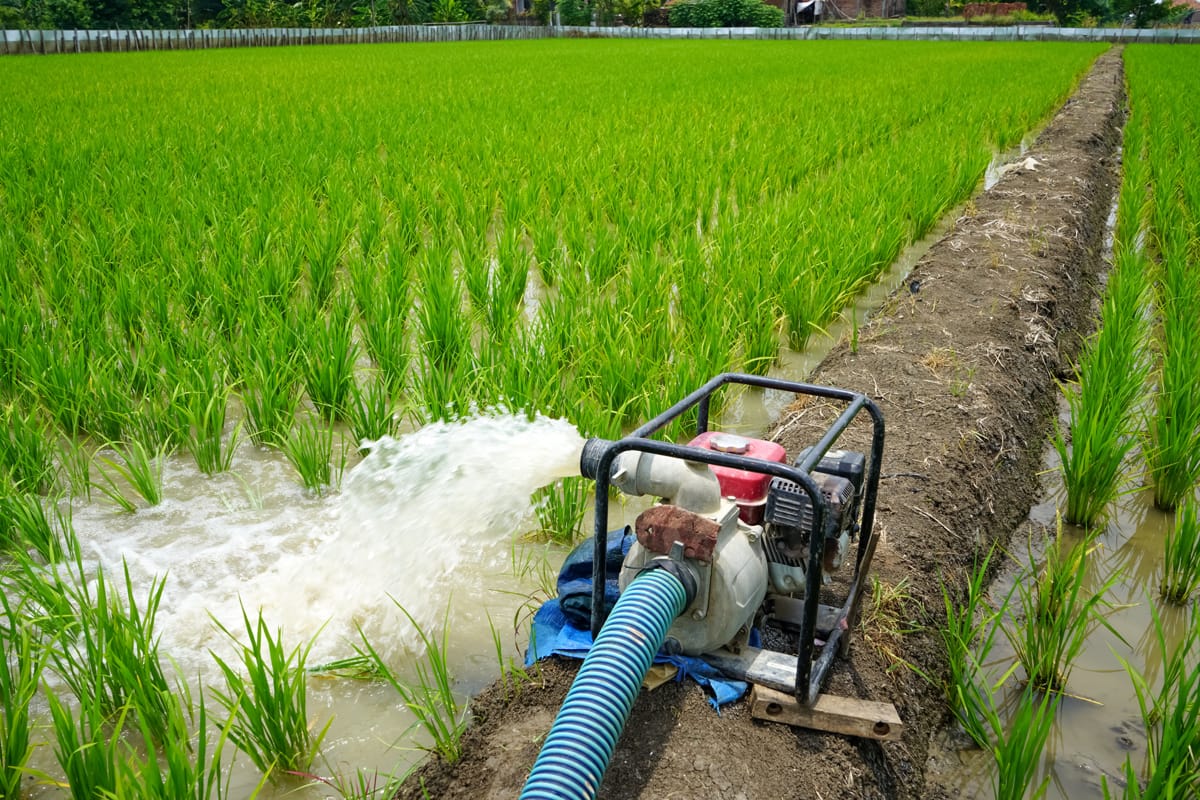As a farmer, one of the critical decisions you must make is selecting the right pump for your farm. A pump is a vital component of any agricultural operation, used for various tasks such as irrigation, livestock watering, and water transfer.

Choosing the right pump for your specific farm needs is crucial to ensure optimal performance, efficiency, and cost-effectiveness. But, with a wide range of pump types, sizes, and features available in the market, it can be overwhelming to make the right choice.
So how do you choose the right pump that meets your farming needs?
It’s important to understand that farms differ regarding the water needed, the topography, and other variables. As such, different pumps are suited for different farms. To ensure you make the right decision, read on for some tips:
- Get A Proper Supplier
One of the most critical factors any farmer should consider is the supplier. A reliable pump supplier will have many pumps to choose from that meet different farming needs. They should also be able to provide technical advice and support when needed, so it’s essential to ensure you get one with good customer service. Some key points to use in determining the supplier includes the following:
- Technology Used: Make sure that the supplier can provide pumps with technologies that offer better functionality, performance, and durability. Moreover, they should engineer the pumping systems to fit any specific needs that you may have on your farm.
- Price: Pumps come at different prices. However, the supplier you’ll choose should be able to provide competitive prices and offer discounts, depending on the type of pump that you need.
- Warranty: A reliable supplier should provide warranties for the pumps they sell to ensure they are long-lasting and high quality. It’s essential, as it gives you peace of mind knowing that you are covered in case problems may arise. Moreover, pumps can be exposed to a lot of wear and tear, so getting a warranty is essential for protecting your investment.
- Reviews: It’s essential to check the supplier’s reviews before purchasing. It’ll allow you to get feedback from previous customers and see if their products are up to par.
- Installation And Support: A reliable supplier should be able to provide installation, and after-sales support to ensure that the pump is installed correctly, maintained, and repaired. It’ll help you save time and money in the long run, as your pump won’t need frequent repairs or maintenance.
Getting the right supplier can solve many challenges you’re likely to face when selecting and installing the right pump for your farm. You can thoroughly research several manufacturers and suppliers before buying from them. You can check sites such as nwflowtech.com and similar ones to get information about their pumps and overall customer satisfaction.
- Identify Your Needs
Another vital factor to consider is your needs and how the pump can meet them. They include the amount of water needed and its usage, the terrain, soil type, and other variables affecting the effectiveness of the pump.
The pump’s size, type, and power output should be able to meet these needs without being overly assertive or too weak. For example, you may not need a large and powerful pump if you have a small farm. But, if you have a large plot of land, you’ll likely require high-powered pumps.
It’s also important to consider the water pressure you need for your tasks. High-pressure pumps are typically necessary for sprinkler systems and other heavy-duty tasks, while low-pressure pumps are for light irrigation systems. Understanding your needs ensures you get a pump fit for your purpose without wasting money on unnecessary features.
- Consider Your Water Source Type
The type of water source you have will determine the type of pump that you need. Water sources can include surface water, groundwater, and chemical solutions. Different pumps operate effectively depending on the sources.
Here are the different pumps needed for different water sources:
- Surface Water: For surface water, a centrifugal pump is typically used. The design of the pump allows it to move large volumes of water quickly and efficiently while ensuring that the pressure remains constant. A centrifugal pump doesn’t overload with an increased total dynamic head (TDH), which measures the total pressure of a water system.
- Groundwater: Submersible pumps are used for groundwater sources as they can operate underwater and move large amounts of liquid at high pressures. Submersible pumps also come with adjustable motors depending on the pressure needed.
- Chemical Solutions: A positive displacement pump is best for chemical solutions as it can move fluids at relatively low pressures with minimal pulsation. Positive displacement pumps have different designs ranging from rotary to reciprocating and can be used for various applications.
Your water source should greatly influence your pump selection. You’ll want to make sure that the pump you choose can meet the challenges of your water source while also being efficient and long-lasting.
- Compatibility With Irrigation Equipment
Some pumps may require additional irrigation equipment to operate effectively. You’ll want to ensure that the pump you choose is compatible with your existing irrigation equipment, such as sprinkler systems, rainwater collectors, and other parts. Compatibility is vital if you want a system that runs efficiently and reliably.
While some pumps may come pre-installed with necessary features, others may require additional operating components. Be sure to check this before purchasing the pump and make sure that all components are compatible.
You can also choose an intelligent pump that collects data such as soil humidity, temperature, and other environmental factors to help you make better decisions about when and how to irrigate.
- Calculate The Efficiency Of The Pump
The pump’s efficiency is crucial as it determines how much energy you’ll use to power it. A more efficient pump requires less energy which means lower electric bills. To calculate the efficiency of a pump, look at the flow rate and the power needed to achieve that flow rate. You can use the formula Efficiency% = Q * H / 3.67 * P1.
- Q is the water flow in m3/h.
- H is the head pressure in meters.
- P1 is the motor’s kW.
The higher the efficiency, the better choice it is for your farm. You can install pumps with inverter technology, enabling them to adjust their speed based on demand, so you don’t have to worry about wasted energy or high electric bills.
- Look At Important Ratings
Looking at the ratings associated with a pump before purchasing is essential. Some of the ratings you should look at include the following:
- Total Head Lift: This is the total height a pump can lift water. It calculates a pump’s power to lift the water over a particular distance.
- Gallons Per Minute: This is the rate at which a pump can move water. It measures the number of gallons of water the pump can move in one minute. If you need a more powerful pump, you can choose one with a higher GPM rating.
- Volts: This is the amount of electrical voltage a pump needs. You’ll want to ensure you have an adequate power supply for your pump so it can operate efficiently and safely.
- Suction Head: The vertical distance from which a pump can draw water. Depending on the depth of your water source, you’ll need to guarantee that the suction head is adequate for your pump to work effectively.
Once you have information about the crucial ratings, you can make an informed decision about which pump is the best for your farm.
- Check The Pump Size
As with any other equipment, you’ll want to ensure that the pump size is adequate for your needs. The larger the pump, the more water it can move in a given amount of time and over a specific distance.
Here are some key factors that determine the size of a pump:
- Flow Rate: The amount of water the pump can move within a specific period. The flow rate is measured as gallons per hour for drip irrigation or per minute for sprinkler irrigation. The pump’s minimum flow rate should equal or be greater than the maximum flow rate of your irrigation system.
- System Pressure: This is the pressure required to move water through your irrigation system. The higher the pressure, the more power is needed from your pump. Different irrigation systems require pumps with different pounds per square inch (PSI) pressure. For example, drip irrigation requires 10-30 PSI, rotary sprinkler heads require 30-45 PSI, while sprinkler rotors require 45-60 PSI.
- Motor Protection: Choose a pump with adequate motor protection equal to or greater than the total head lift of the pump. This will help protect your motor from damage caused by pressure fluctuations.
Getting the right pump size is crucial for optimum performance and efficiency. Plus, you need to ensure that the pump you choose can also handle future demands. If your farm grows over time, then your irrigation needs may increase.
- Consider The Pump’s Horsepower
Horsepower is the amount of energy a pump uses to move water. The higher the horsepower, the more powerful and efficient the pump. Pumps are rated in hp (horsepower) or kW (kilowatts). So, you should select a pump with enough horsepower to meet your needs without being too overpowered for the system.
To calculate the ideal horsepower rating for your pump, you’ll need to consider the total head lift, flow rate, and system pressure. The formula of the horsepower is WHP = (TDH×Q×SG) / 3960.
- Water horsepower (WHP) = minimum power the water pump needs.
- TDH = Vertical distance in feet the water travels + friction loss in feet from the pipe.
- Q = flow rate of the water measured in GPM
- SG = specific gravity of water. When pumping water, the SG is one.
The WHP can also calculate brake horsepower (BHP) by dividing WHP by pump efficiency. BHP is the actual power the motor requires to run the pump, and ideally, it should be between 50%-85%.
- Choose The Right Material For Your Pump
The material of your pump is an essential factor to consider when selecting a water pump for your farm. Different materials offer different levels of durability and performance.
Here are some of the most common materials used for irrigation pumps:
- Cast Iron: This durable and reliable material offers good performance in many conditions.
- Stainless Steel: Stainless steel pumps are corrosion-resistant and suitable for salty water applications.
- Aluminum: It is lightweight, cost-effective, and highly resistant to corrosion. However, it’s not suitable for high-pressure applications.
- Bronze: This is a popular choice for several irrigation systems because it offers good performance and durability.
- Thermoplastic: Thermoplastic pumps are lightweight, easy to install, and require less maintenance than other materials. They’re suitable for lower-pressure operations with high flow rates.
You can determine what material is best for the pump you need depending on where you’ll use it and the nature of your irrigation system.
- Consider The Power Source
Your pump needs a power source to run. When selecting the right power source, you have the option of fuel-powered engines, electric motors, or direct current from batteries. Fuel-powered engines are typically used in remote locations, while electric motors are more suitable for areas with access to electricity.

Some electric pumps also come with solar panel kits that can be used to generate energy. If you want sustainable farming and come from areas with adequate sunlight, solar-powered pumps are a great option. Make sure to choose a power source that is reliable and cost-effective for your irrigation needs. Check with the manufacturer on what type of power source your pump requires.
Conclusion
Selecting the right pump for your farm can be a challenging feat. But with this guide, you should have all the information you need to make an informed decision. Remember all these considerations—flow rate, head lift, horsepower, materials, and power sources—to ensure you choose the best pump.
By selecting the right pump for your farm, you can ensure that your irrigation system runs efficiently so that your crops get the needed water. You can also save money in the long run by avoiding costly repairs or replacements of the pump due to improper selection.




Recent Comments